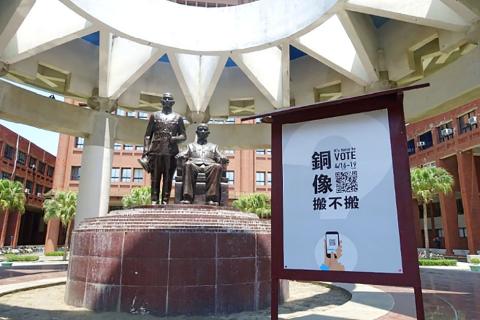Kaohsiung’s National Sun Yat-sen University (NSYSU) is to host a school-wide referendum tomorrow to decide whether to move the statues of Sun Yat-sen (孫中山) and Chiang Kai-shek (蔣介石) on its campus.
The referendum reflects Taiwan’s democratic education and is the first of its kind among the nation’s colleges and universities, NSYSU’s administration said in the announcement.
Under an atmosphere of rationality and mutual respect, the school can hopefully resolve an issue that has concerned its students and faculty for a long time, it added.

Photo: Huang Hsu-lei, Taipei Times
Student representatives on Oct. 21, 2016, at a university affairs meeting proposed removing the statues that stand outside the university’s Info-Library Building.
The administration at the end of that year formed an ad hoc committee and on Nov. 3 last year decided to host a school-wide referendum on the issue.
Online voting is to open at 9am tomorrow and close at 4pm on Thursday, the Office of Student Affairs said on Friday.
Students and faculty who were enrolled or employed as of Tuesday are eligible to vote in the referendum, as well as Chinese and other foreign students, the office added.
Participants may select one of three options: keep the statues where they are, move them to a different location on campus or move them off-campus, the office said.
A total of 10,862 people are eligible to vote and there is no minimum voter turnout requirement for the referendum to pass, it added.
The bronze statues are landmarks, an unnamed NSYSU professor said, asking if the university could retain its name if the statue of Sun is removed.
Others have proposed removing Chiang’s statue, but keeping the one of Sun, saying that the former is often vandalized while the latter is relatively uncontroversial.
A referendum is the best way to decide how campus space is used and how history should be perceived, NSYSU student association president Yuan Ho-ching (袁禾青) said, adding that no matter the result, it would be the collective decision of the entire school community.

Taiwan is stepping up plans to create self-sufficient supply chains for combat drones and increase foreign orders from the US to counter China’s numerical superiority, a defense official said on Saturday. Commenting on condition of anonymity, the official said the nation’s armed forces are in agreement with US Admiral Samuel Paparo’s assessment that Taiwan’s military must be prepared to turn the nation’s waters into a “hellscape” for the Chinese People’s Liberation Army (PLA). Paparo, the commander of the US Indo-Pacific Command, reiterated the concept during a Congressional hearing in Washington on Wednesday. He first coined the term in a security conference last

Prosecutors today declined to say who was questioned regarding alleged forgery on petitions to recall Democratic Progressive Party (DPP) legislators, after Chinese-language media earlier reported that members of the Chinese Nationalist Party (KMT) Youth League were brought in for questioning. The Ministry of Justice Investigation Bureau confirmed that two people had been questioned, but did not disclose any further information about the ongoing investigation. KMT Youth League members Lee Hsiao-liang (李孝亮) and Liu Szu-yin (劉思吟) — who are leading the effort to recall DPP caucus chief executive Rosalia Wu (吳思瑤) and Legislator Wu Pei-yi (吳沛憶) — both posted on Facebook saying: “I

The Ministry of Economic Affairs has fined Taobao NT$1.2 million (US$36,912) for advertisements that exceed its approved business scope, requiring the Chinese e-commerce platform to make corrections in the first half of this year or its license may be revoked. Lawmakers have called for stricter enforcement of Chinese e-commerce platforms and measures to prevent China from laundering its goods through Taiwan in response to US President Donald Trump’s heavy tariffs on China. The Legislative Yuan’s Finance Committee met today to discuss policies to prevent China from dumping goods in Taiwan, inviting government agencies to report. Democratic Progressive Party Legislator Kuo Kuo-wen (郭國文) said

The Ministry of Economic Affairs has fined Taobao NT$1.2 million (US$36,900) for advertisements that exceeded its approved business scope and ordered the Chinese e-commerce platform to make corrections in the first half of this year or its license would be revoked. Lawmakers have called for stricter supervision of Chinese e-commerce platforms and more stringent measures to prevent China from laundering its goods through Taiwan as US President Donald Trump’s administration cracks down on origin laundering. The legislature’s Finance Committee yesterday met to discuss policies to prevent China from dumping goods in Taiwan, inviting government agencies to report on the matter. Democratic Progressive Party